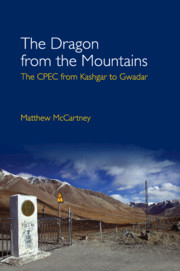Book contents
- Frontmatter
- Dedication
- Contents
- List of Maps and Figures
- List of Tables
- Preface
- Acknowledgements
- 1 Introduction
- 2 Big Infrastructure: Big Problems or Big Benefits?
- 3 CPEC Spillovers Rippling Outwards
- 4 Through the Eyes of Who? Evaluating the Success of the CPEC
- 5 The Dragon Uncoils: Special Economic Zones (SEZs) from Shenzhen to Africa
- 6 The Dragon's Embrace: Pakistan–China Trade Policy
- 7 The Will of the Dragon: The Importance of an Industrial Policy
- 8 Conclusion: The Way of the Dragon or the Way of the Falcon?
- Bibliography
- Index
Preface
Published online by Cambridge University Press: 06 August 2021
- Frontmatter
- Dedication
- Contents
- List of Maps and Figures
- List of Tables
- Preface
- Acknowledgements
- 1 Introduction
- 2 Big Infrastructure: Big Problems or Big Benefits?
- 3 CPEC Spillovers Rippling Outwards
- 4 Through the Eyes of Who? Evaluating the Success of the CPEC
- 5 The Dragon Uncoils: Special Economic Zones (SEZs) from Shenzhen to Africa
- 6 The Dragon's Embrace: Pakistan–China Trade Policy
- 7 The Will of the Dragon: The Importance of an Industrial Policy
- 8 Conclusion: The Way of the Dragon or the Way of the Falcon?
- Bibliography
- Index
Summary
There is excitement in Pakistan, the academic and political equivalent of winning the cricket world cup. After years of failing to meet short-term International Monetary Fund (IMF) programmes, Pakistan has been promised a well-financed, long-term developmental partnership. This is the China–Pakistan Economic Corridor, or the CPEC. Between 1970 and 2001, a desultory $7 billion of FDI dribbled into Pakistan. China has promised to invest more than $60 billion in roads, railways, energy, industrial parks and other projects between 2015 and 2030. China promises this will not be driven by IMF-style conditionalities but that the CPEC will be tailored to Pakistan's domestic political and economic agenda. The Government of Pakistan has proclaimed in a succession of government plans that upgrading infrastructure is a priority to promote rapid and sustainable economic growth. Practical efforts to follow these goals through in practice continually failed in response to economic crisis, IMF-motivated budget cuts or the lack of sustained political will. Here is the political will. The Dragon from the Mountains. China has more than 40 years’ experience of fuelling its own rapid industrial and export-led growth, supported by massive investment in infrastructure. China is committed to the long-term. The US was ever fickle and committed less to Pakistan than to wider geopolitics in Afghanistan, Soviet Russia or Iran, in which Pakistan occasionally and accidentally proved useful. The CPEC can be told as part of a wider story, that of the end of the US-led world order and the creation of a new Eurasian supercontinent headed by China (Macaes 2018a, 2018b). What part will Pakistan play in this story?
Some CPEC supporters have daydreamed that the CPEC can help spur Pakistan into emulating the rapid economic growth of the Tiger or Dragon economies of the 1960s and 1970s and becoming, perhaps, a ‘Falcon Economy’. The detractors are equally adamant. They variously claim that the CPEC is an economic fig-leaf to cover the real geopolitical intentions of China, to access oil directly from the Middle East and to gain control of the deep-sea port at Gwadar in southwest Pakistan and near to the Gulf. Some have labelled the CPEC as ‘predatory lending’, intending to push Pakistan into a debt trap to increase Chinese leverage over Pakistan's domestic and foreign policy. Remember, say the detractors, the Suez Canal that tipped Egypt into a nineteenth-century debt crisis, and eventual colonisation by Britain.
- Type
- Chapter
- Information
- The Dragon from the MountainsThe CPEC from Kashgar to Gwadar, pp. xiii - xviPublisher: Cambridge University PressPrint publication year: 2021



